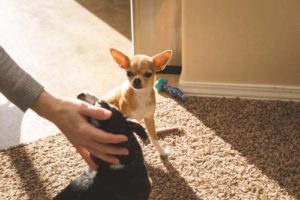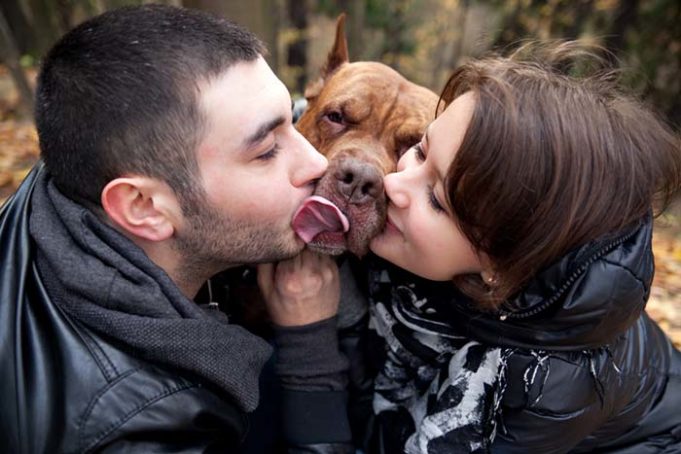There’s a green-eyed monster lurking inside your furry best friend but the situation is not as complicated as you might think.
While dogs are famous for loving their owners unconditionally with their pure hearts, they can apparently have a jealous streak, too. A study from researchers at the University of California, San Diego learned that dogs have a little green-eyed monster within them.
“Our study suggests not only that dogs do engage in what appear to be jealous behaviors but also that they were seeking to break up the connection between the owner and a seeming rival.”
Experts did an experiment involving 36 dogs, their human best friends, and an animated toy dog. The owners were asked to pet the toy while their dog was nearby. They were also asked to pet other items in the room, such as a children's book that made noises and a Jack-o-Lantern.
The dogs reacted differently to the situations by barking, biting or pushing the toy or their owner. The findings were published in the journal PLOS One.
Jealousy is Instinctive
The experts observed that when the dog owners stroked or tapped the head of the fake toy dog to show affection, their pets would show signs of aggressive or attention-seeking behavior. The dogs also manifested more interest in the fake dog than the book or the Jack-o-Lantern, and at least 86 percent tried to sniff this new animal, perhaps to study the threat.
A third of the dogs tried to separate their owner from the fake dog or snapped at the lifeless animal. A number also tried to gain favor by showing signs of affection for their master.
Christine Harris, one of the study authors, said in the press release that the dogs' seemed to be protecting the relationship they have with their owner. But while they saw the fake dogs as threats and showed markers of jealous behaviors, their jealousy was different from the way most humans felt this emotion.
“We can't really speak to the dogs' subjective experiences, of course, but it looks as though they were motivated to protect an important social relationship.”
The expert likened the dogs' reactions as somewhat similar to another experiment involving six-month-old babies who expressed realistic jealous reactions when their mothers showed affection for a doll. Like dogs, babies are pure of heart and yet they can also feel fear or anger in the most instinctive form.
Harris decided to do the experiment about dog jealousy after a visit to her parents' home. She was petting her the dogs when each one tried to knock her hand away from the other, so that both her hands would just exclusively pet one of the dogs.
When Dogs Don't Get Jealous
 There were also dogs in the experiment that didn't show signs of jealousy and while further studies might be necessary, Harris has her own theory for this observation.
There were also dogs in the experiment that didn't show signs of jealousy and while further studies might be necessary, Harris has her own theory for this observation.
Speaking with Live Science, the expert said that dogs that don't have a jealous streak might either be too smart or too bonded to their owners. It's possible they know that the fake dog isn't a threat because it's not real. Also, they might have such a good relationship with their human.
Animal behaviorist Patricia McConnell echoed Harris' findings and said via CNN that while dogs might show jealousy, theirs isn't a complex feeling compared to humans
Handling Dog's Jealousy
Meanwhile, if you care for many dogs and have to deal with episodes of rivalry and jealousy, the best way to handle this is to train the dogs to learn calmness and discipline. You need to redirect their excited reactions for your affection into a positive behavior.
For instance, instead of petting your dogs as soon as you get home, teach them to stay or sit. If they fight for some attention, be calm and ignore their rowdy behavior. Pet and reward them only when they learn to be still.
Be firm with this routine until your dog understands that they shouldn't be clamoring for attention. If your dog shows jealousy over your boyfriend or girlfriend, make sure that they spend some quality time together as well so that they develop a bond.
READ NEXT: 10 Most Common Dog Behavior Problems (and How to Fix Them)














